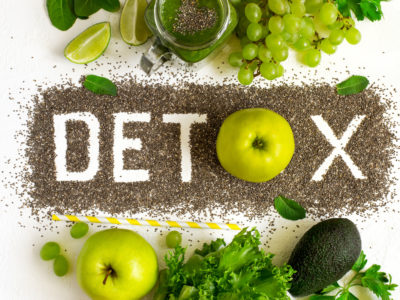Table of Contents[Hide][Show]
- The Challenge of Diagnosing Hypothyroidism
How to Cure Hypothyroidism Permanently with These 8 Tips+−
- 1. Go Gluten and A1 Casein Free
- 2. Say No to BPA
- 4 Simple Ways to Reduce Plastics In Your Home
- 3. Check Your Iodine Levels
- 4. Consider a Heavy Metal Detox
- 5. Consume More Selenium
- 6. Take Adaptogen Supplements
- 7. Remove the Silver Fillings
- 8. Lower Carbohydrate Intake
- Bonus! Consume More Fiber for Better Gut Health
- Low Energy? Consider A Liver Detox Diet Plan
- 10 Foods To Add To Your Microbiome Diet
- What Is Leaky Gut Syndrome And How Does It Affect Your Health?
I can’t stress enough the importance of knowing how to treat hypothyroidism. Every week, I get questions about hormone imbalance and slow metabolism.
These are conditions chronically plaguing both men and women all across America.
What causes most of these issues? It’s usually problems with the thyroid.
Here, I am going to tell you the best natural remedies and cures for the thyroid.
Did you know that according to the United States National Library of Medicine and National Institutes of Health, an estimated 27 million Americans suffer from thyroid disease? About 13 million of these sufferers are currently undiagnosed.
Additionally, the risk factors of thyroid disease increase as you age. Women are seven times more likely than men to be diagnosed with thyroid issues.
The thyroid is a small gland in the middle of the lower neck. It produces hormones such as thyroxine that impacts each and every cell, organ, and tissue in the human body.
The thyroid glands are also responsible for regulating body temperature and the heart rate. The thyroid hormone production affects the production of protein and controls of the rate of your metabolism.
What Causes Hypothyroidism and Other Thyroid Issues?
The reason for the thyroid disorder can be varied, but the four most common causes of hypothyroidism and other problems are the following:
- Toxicity such as radiation and heavy metal exposure
- Deficiency in iodine and selenium
- Food intolerance such as gluten and A1 casein allergy
- Hormone imbalance due to high cortisol from stress, too many carbs, or too little fat in the diet
In just a minute, I will discuss the top ways to cure your thyroid problem. Let’s first see if you potentially have a thyroid problem.
- An underactive thyroid or hypothyroidism is when the thyroid gland doesn’t produce enough thyroid hormone.
- Overactive thyroid or hyperthyroidism is when the vital gland produces too much of the needed regulatory hormone.
For our discussion today, let’s talk about hypothyroidism.
Related
Functional Medicine: Thyroid Health at Its Optimum, Naturally
Tired of struggling with an under or overactive thyroid? Learn how functional medicine could help find the root cause of your thyroid issues.
What Is Hypothyroidism?
To treat hypothyroidism naturally, you need to know more about it. As mentioned, it is the underactive production of the thyroid hormones: thyroxine (T4) and triiodothyronine (T3).
As part of the endocrine system, the thyroid glands can secrete, store, and produce these hormones. To do that, though, it needs two things, which are iodine and the brain.
The thyroid glands need iodine, a trace mineral, to help produce the hormones, but they rely on the brain to tell them how much and when to produce.
In the brain, two components work with the thyroid glands. These are the pituitary glands and the hypothalamus.
The thyroid glands receive their hormone production instructions from the pituitary glands. These are responsible for creating the thyroid-stimulating hormone (TSH).
The pituitary glands, meanwhile, will need the thyroid-releasing hormones (TRH) from the hypothalamus. These tell the glands when it’s time to tell the thyroids to produce T3 and T4.
The pituitary is sensitive to the levels of thyroid hormones in the blood. When they are low, the gland releases more TSH.
When the thyroid levels are high, the gland then reduces the production of TSH. This way, the thyroid will also decrease the creation and secretion of T3 and T4.
A person displaying hypothyroid symptoms or diagnosed with hypothyroidism will have a low level of thyroxine and high TSH.
What Are the Signs of Hypothyroidism?
You can also learn how to treat hypothyroidism when you can spot the telltale signs and symptoms of the problem. The symptoms of hypothyroidism include:
- Extreme fatigue
- Depression
- Forgetfulness or brain fog
- Weight gain
They are somewhat different from the common symptoms of hyperthyroidism:
- Irritability
- Nervousness
- Muscle weakness
- Unexplainable weight loss
- Vision and eye issues
- Sleep disturbances and problems
The Challenge of Diagnosing Hypothyroidism
Although these are the symptoms associated with thyroid issues, either type of thyroid problem is very difficult to diagnose without a proper hypothyroidism test, which is usually a urine or blood test.
Knowing how to treat hypothyroidism is also complicated due to its many variations. The hypothyroidism symptoms and even hypothyroidism causes for each can vary:
- Secondary Hypothyroidism – This is hypothyroidism induced by problems affecting the hypothalamus or the pituitary gland (or both). A good example is tumor growth.
- Overt Hypothyroidism – According to the American Thyroid Association, this is another classification of hypothyroidism characterized by two important factors: low T4 and high TSH. Individuals with these results will usually need hypothyroidism medication.
- Subclinical Hypothyroidism – Is a mild thyroid disorder where only the TSH level is abnormal. The dosage of the medication depends on the severity.
Primary hypothyroidism is the most common type of hypothyroidism, and the problem lies on a dysfunctional thyroid gland. Two of the possible reasons are Hashimoto’s hypothyroidism and congenital hypothyroidism.
In congenital hypothyroidism, the thyroid gland may be deformed or defective at birth. This results in the partial or complete non-production of the thyroid hormones.
According to Dr. Datis Kharrazian, 90% of people with hypothyroidism have Hashimoto’s. It is an autoimmune hypothyroid condition whereby the immune system attacks the thyroid tissue.
So to cure a thyroid disease or an autoimmune disease, you have to get to the source of the imbalance. You should not suppress the symptoms, which is what many medications do.
Most often, thyroid conditions are treated with pharmaceuticals like Synthroid. These can have damaging side effects on your overall health.
The great news is there are all-natural remedies that can help support thyroid function!
How to Cure Hypothyroidism Permanently with These 8 Tips
Here are the eight secrets to fixing your thyroid issues. Following these can reduce risk factors associated with the condition.
You may also be able to avoid the common treatment options. These include thyroid hormone replacement therapy, thyroid surgery, and radioactive treatment.
1. Go Gluten and A1 Casein Free
The most common allergies and food intolerances today are from wheat and dairy products because of the hybridized proteins of gluten and A1 casein.
At least 1 in every 133 Americans has celiac disease. It is an autoimmune condition triggered by the consumption of gluten.
These proteins can cause a “leaky gut.” In turn, it will cause inflammation of the thyroid and affect its function.
Follow a grain-free diet or at least go gluten-free. Only consume dairy products that come from A2 cows, goat milk, or sheep milk.
2. Say No to BPA
Bisphenol A (BPA) is found in plastic bottles. It can disrupt your endocrine system and affect your thyroid.
I recommend only drinking out of glass, stainless steel, or BPA-free plastic bottles.
Related
4 Simple Ways to Reduce Plastics In Your Home
By tweaking our day-to-day habits and choices, we can eliminate unnecessary plastic consumption—all while using this material in a safe way.
3. Check Your Iodine Levels
If they are low, use kelp or organic liquid iodine supplement. You can also increase your intake of seaweed.
4. Consider a Heavy Metal Detox
One of the ways how to treat hypothyroidism is using a combination of milk thistle, turmeric (we love Purality Health® Micelle Liposomal Turmeric), chlorella, and cilantro to detox these harmful metals from your cells and organs.
5. Consume More Selenium
Make sure you’re getting enough selenium in your diet, but also don’t go overboard. Some of the best selenium-containing foods are Brazil nuts, salmon, sunflower seeds, beef, mushrooms, and onions.
6. Take Adaptogen Supplements
Adaptogens can lower cortisol levels and improve thyroid function. Options are ashwagandha and tulsi.
7. Remove the Silver Fillings
If you have amalgam fillings, talk with a DAMS (Dental Amalgam Mercury Solutions) mercury-safe dentist about proper removal.
8. Lower Carbohydrate Intake
Lower your intake of sugars and grains and replace them with healthy fats. Most women especially consume far too many carbs, which can increase estrogen and negatively affect the thyroid.
Instead, consume healthy fats that will balance hormones. These can be coconut oil, coconut milk, avocado, grass-fed beef, wild salmon, chia, flaxseeds, and hemp seeds.
Bonus! Consume More Fiber for Better Gut Health
Besides increasing fat, another strategy on how to treat hypothyroidism is to eat a high-fiber diet. You should strive to eat at least 25 grams of it in a day.
A diet that’s high in fiber is excellent for the gut bacteria since they feed on the fiber (known as prebiotics). It also reduces the harmful microorganisms that can contribute to a leaky gut and other gut-related diseases.
Final Thoughts
Learning how to treat hypothyroidism takes a while, but there’s no better time to do it than now.
Work with your doctor closely and use the information on this article to be a proactive patient. Explore the different options for the treatment of hypothyroidism, starting with learning more about your gut microbiome and how to heal it.
The tips above and the support of your clinical endocrinologists can eventually help you find a natural cure for hypothyroidism.
You May Also Like…
Editor’s Note: This post was originally published on January 6, 2016, and has been updated for quality and relevancy.







